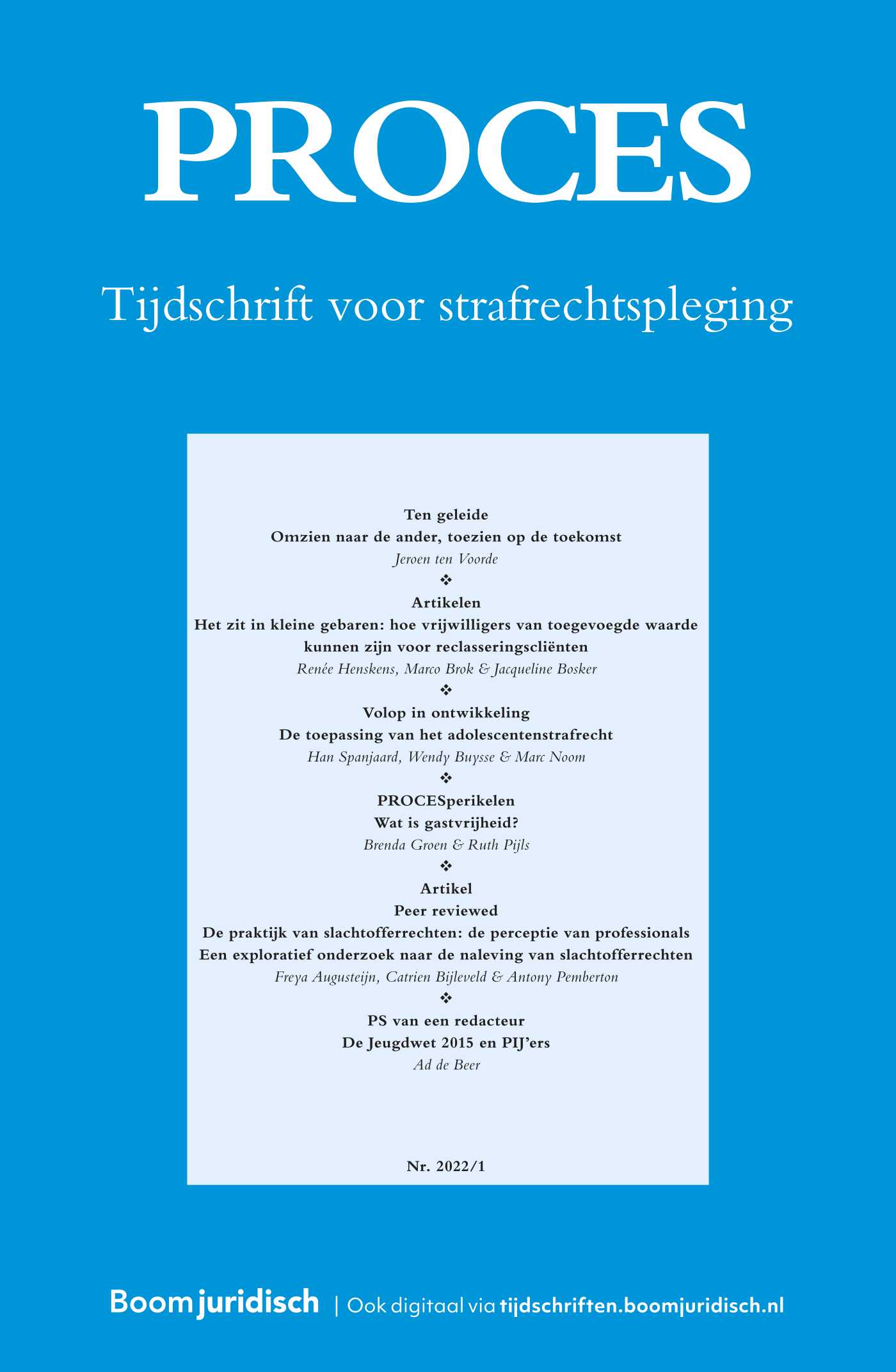|
Several studies associate a good working alliance in the forensic context with positive outcomes such as recidivism reduction. This article reports on a qualitative study on the use of the working alliance at two probation agencies in the Netherlands. 24 probation officers and 6 clients were interviewed. |


PROCES
Meer op het gebied van Criminologie en veiligheid
Over dit tijdschriftMeld u zich hier aan voor de attendering op dit tijdschrift zodat u direct een mail ontvangt als er een nieuw digitaal nummer is verschenen en u de artikelen online kunt lezen.
| Ten geleide |
Gevangen in ongelijkheid |
| Auteurs | Sigrid van Wingerden |
| Auteursinformatie |
| Artikel |
Werkalliantie in de reclasseringspraktijk |
| Trefwoorden | reclassering, effectiviteit, werkalliantie, praktijkonderzoek |
| Auteurs | Annelies Sturm, Dalia Abas en Linda van Galen |
| SamenvattingAuteursinformatie |
| Artikel |
De invloed van oorlogen en conflicten op het werk van veiligheidsprofessionals in Nederland |
| Trefwoorden | war, Conflict, human trafficking, honour based violence, war criminal |
| Auteurs | Janine Janssen, Wilfred Janmaat, Conny Rijken e.a. |
| SamenvattingAuteursinformatie |
|
In this contribution is reflected on the consequences of conflicts abroad for professionals working in the fields of law enforcement, safety and security in the Netherlands. It is demonstrated how, for example, victims and offenders of honour-based violence and human trafficking have also been influenced by conflicts in war zones before coming to the Netherlands. Next to that, war criminals might also be encountered in the Netherlands. Professionals and students as future professionals should be aware of the damaging influence of these conflicts abroad on the mental state and welfare of victims they professionally encounter in the Netherlands. |
| PROCESperikelen |
Duurzaam politiewerk |
| Auteurs | Jip Colenbrander en Ingelou Sybrandij |
| Auteursinformatie |
| Artikel |
Jonge drugscriminelenEen kwalitatief onderzoek naar de achtergrondkenmerken en instroommechanismen van jonge aanwas in de drugscriminaliteit |
| Trefwoorden | Jongeren, Drugscriminaliteit, Achtergrondkenmerken, Instroommechanismen |
| Auteurs | Suzanne de Jong, Victor van der Geest en Sheila Adjiembaks |
| SamenvattingAuteursinformatie |
|
In this article, we explore the background characteristics and entry mechanisms contributing to youth involvement in drug crime. We conducted semi-structured interviews with 28 professionals as well as with 5 youngsters connected to at-risk youth involved in drug crime. Findings show heterogeneity in terms of background characteristics and in terms of involvement patterns. Lack of parental supervision, poor parent-child relationship and limited supervision from school is typically reported to contribute to early involvement overall. Entry mechanisms primarily involve (natural) social processes, driven by mutual trust and the youth’s desire for recognition and status. The influence of the online world remains unclear. |
| Artikel |
|
| Trefwoorden | meerpersoonscelgebruik, Veiligheid, Gevangenis, penitentiaire inrichtingen, MPC |
| Auteurs | Esther van Ginneken, Pauline Jacobs en Junia Bergers |
| SamenvattingAuteursinformatie |
|
The Dutch policy of cell sharing in prisons brings about various problems: first, it is difficult to establish whether people are fit to share a cell. Second, the process of matching cellmates is burdensome. Third, there are safety risks associated with cell sharing. Fourth, refusal of placement in a double cell raises practical and ethical dilemmas. Fifth, cell sharing poses challenges to reward and punishment practices. Finally, there are problems associated with capacity and facilities. An analysis of different sources shows that careful decision-making by staff is at least as important for ensuring safety than the legal guidelines. |
| PS van een redacteur |
‘Psst’ van een intimideur naar de burger-controleurKnelpunten bij de handhaving van het verbod op seksuele straatintimidatie in geval van burgeropsporing |
| Auteurs | Robert Timmers |
| Auteursinformatie |
| Call for papers |
Call for papers |

